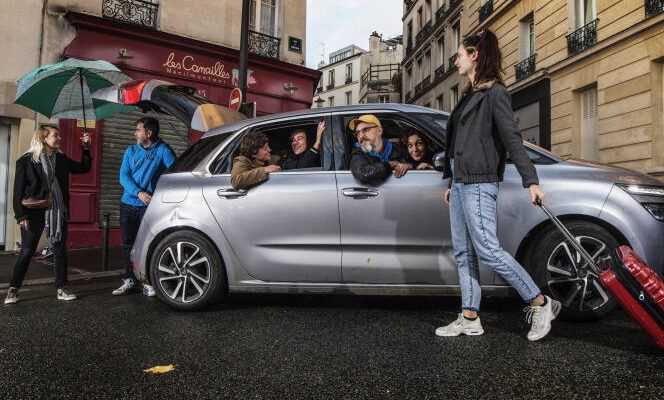Try the experiment. At the foot of a red light, on a weekday morning, in any town in France. One car, two cars, ten cars are waiting, in a line all the longer as the SUVs follow one another. Peer inside. In nine of them only one person – two in the last. Then make a mental note. Forty places available at least, a dozen tons of moving steel, for eleven humans transported. From home to work, the average vehicle occupancy rate is around 1.1.
The car, that solitary pleasure that a new word has come to describe at the start of the millennium: “autosolisme”. Don’t try it at Scrabble. It is not accepted there. No one wants to hear that for daily trips, the solo car is the general rule. Nor, above all, to feel this umpteenth ecological guilt, that of the empty seat. Even less volunteering, among a thousand Ile-de-France residents, never to drive alone for ten months – an experiment which should be launched in early 2022 by four mobility players, including the Renault group.
Like post-Covid traffic jams and the price of gasoline, questions about car use are increasing
Stigmatizing solo driving, here’s a news “Autophobic fad”, annoyed at the writing Jacques Chevalier, which drives the Auto Addict website. Like post-Covid traffic jams, and the price of gasoline, questions about car use are indeed increasing. From its accusing percentages, the statistics point to: transport as the leading emitter of greenhouse gases in France (31%), the automobile alone contributing 16%; the 38 million cars in circulation; the 74% of working people (18 million people) backfiring on the commute to work, morning and evening, mostly one-on-one with the image of themselves in the rearview mirror.
Rationality would like that we fill the cars better to reduce their number, and hence congestion and pollution. Optimization of use, reduction of environmental impact, break away! And develop this daily carpooling for me! But, my general Environment, it is underestimating the force of habit and the attachment to the extension on wheels of the private home (child seat, cake crumbs and dog hair included) lived both as a protective cocoon , decompression airlock, guarantee of flexibility and autonomy.
“37% of households own at least two vehicles, against 32% in 2004, specifies Yoann Demoli, who teaches sociology at the University of Versailles Saint-Quentin-en-Yvelines. If the car is used more by a single person, it is because it makes it possible to solve an increasingly complex spatiotemporal equation. Schedules are very constrained, out of sync within the family, housing is far from work… ” As a result, “Even if carpooling is the best solution in the short term, people don’t want it, summarizes Joël Hazan, mobility expert at the Boston Consulting Group (BCG). This is the paradox of collective action: everyone has an interest but no one has an interest in playing missionaries. “
You have 76.37% of this article to read. The rest is for subscribers only.
